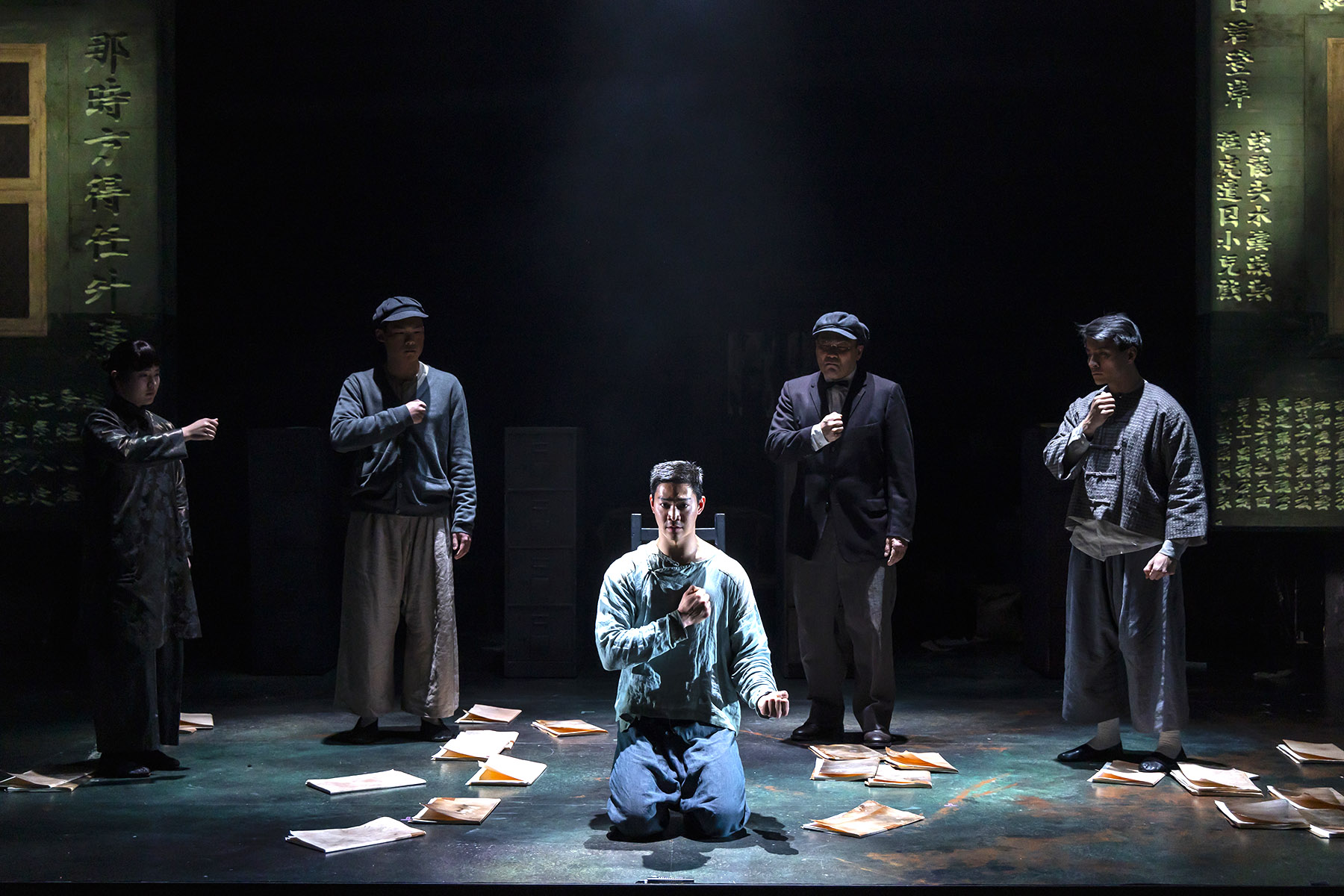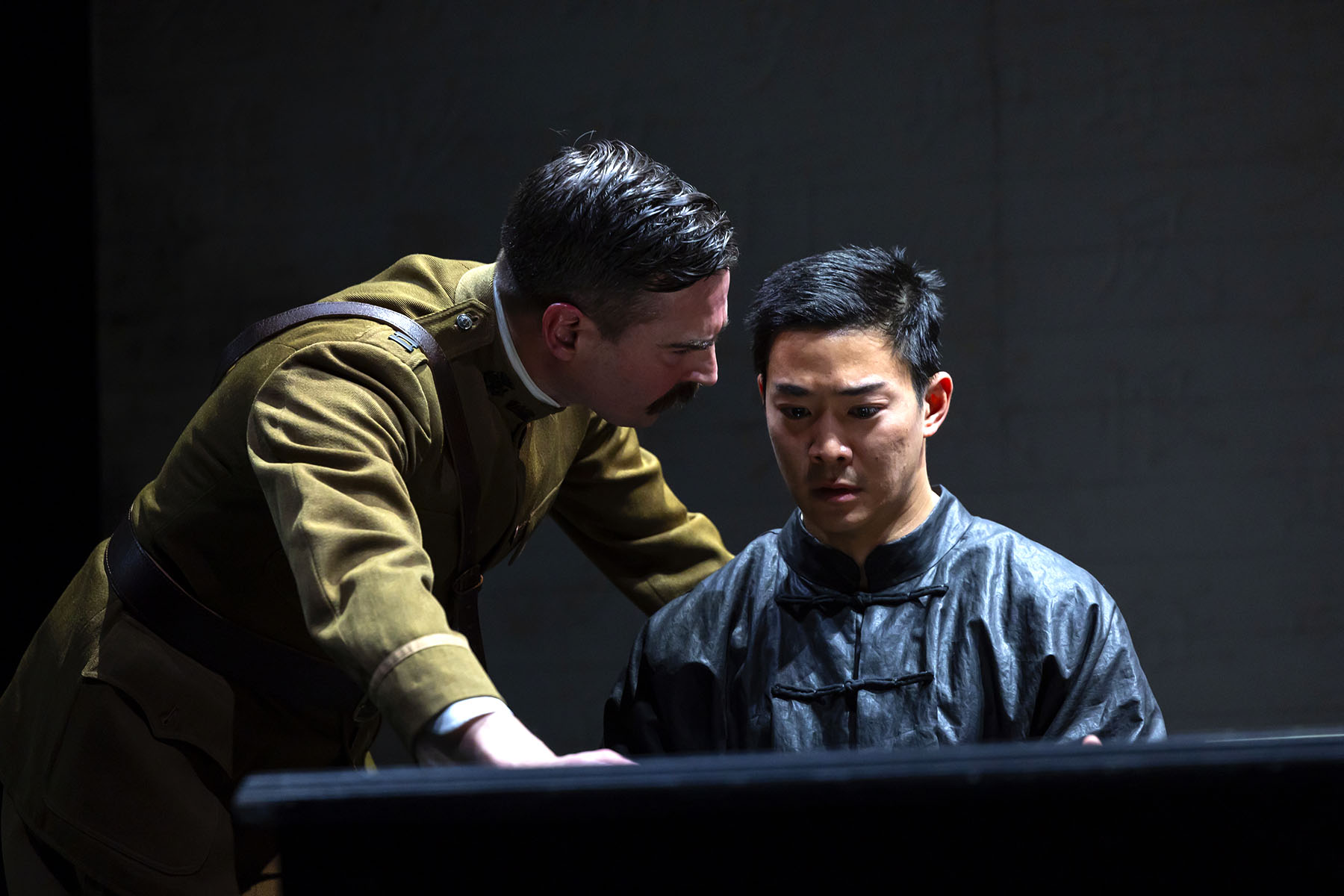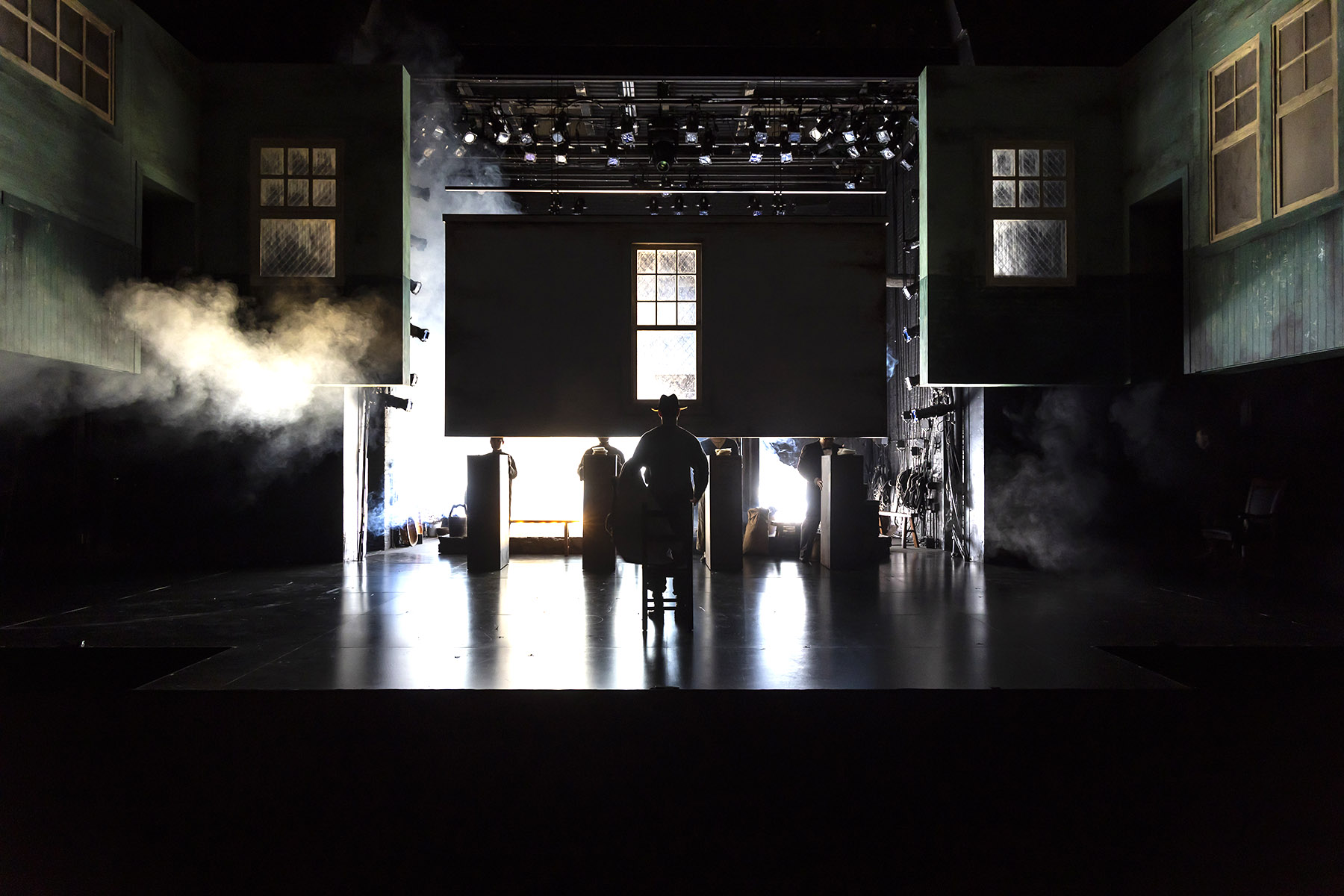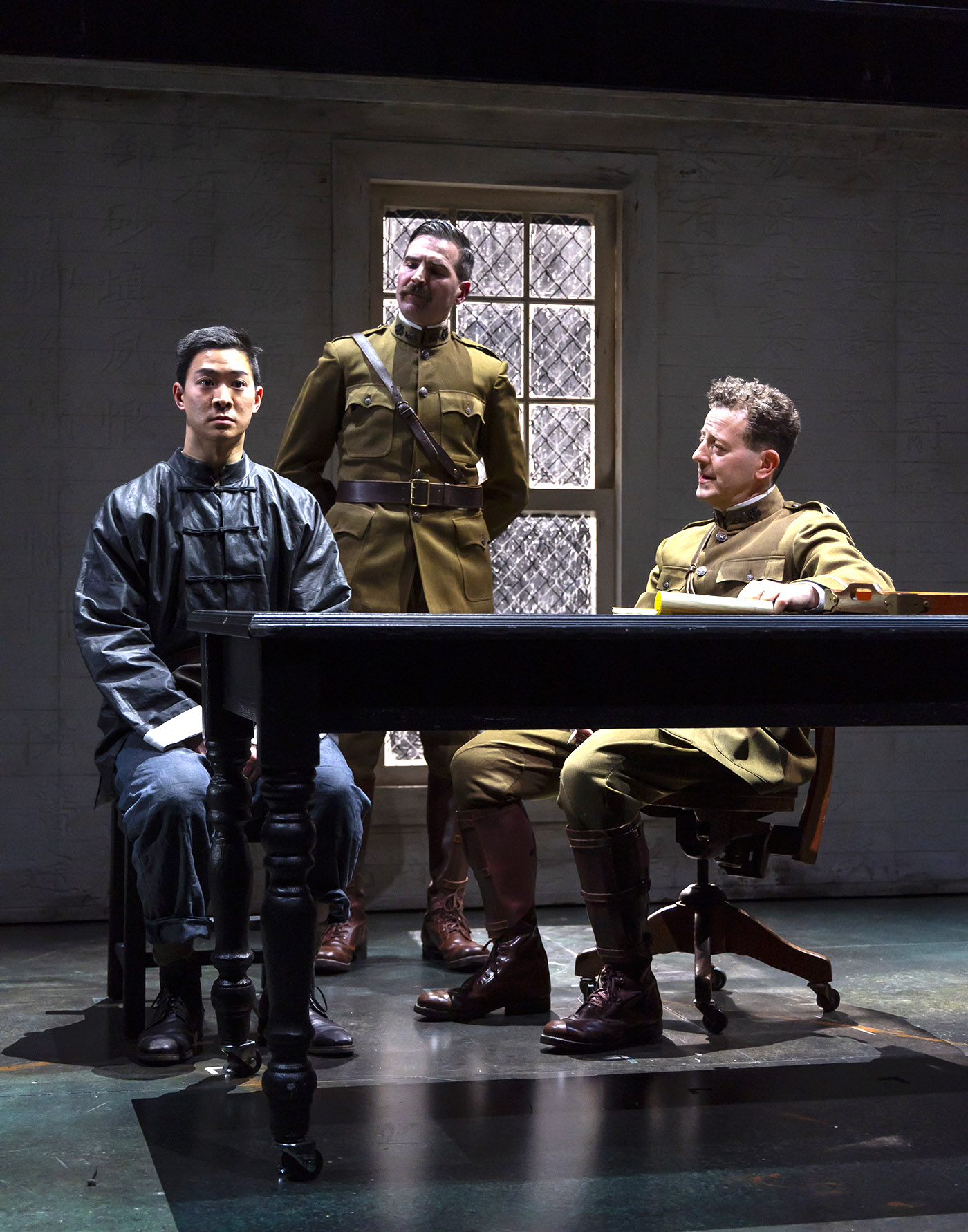Lloyd Suh's play sheds light on the experiences of Asian immigrants arriving at San Francisco's Angel Island, Mingmei Li reports in New York.

The narrow confines of a dim interrogation chamber, where the hours stretched into eternity and relentless inquiries abounded were often the first impression Asian immigrants had of that "far country", America.
Undergoing the process over and over again was how they spent their time at San Francisco's Angel Island detention center. The detention facility opened in 1910, with buildings to house and care for detainees, a pier, a hospital, and regular boat service to the mainland.
Returning to the crowded and dark dormitory, immigrants were then brought back to the interrogation chamber, where they answered the same tactical questions again. Under the Chinese Exclusion Act of 1882, which persisted until 1943, Chinese immigrants faced even stricter examinations and investigations than other Asian migrants, and Angel Island was the entry point for most of the approximately 175,000 Chinese immigrants who came to the United States between 1910 and 1940.
READ MORE: Putting on their peak performance
Recounting the story of a chosen family coming together, carrying invented biographies and poems of longing on an arduous journey from Taishan in Guangdong province to the US, Lloyd Suh's The Far Country, one of the finalists for the 2023 Pulitzer Prize in Drama, was performed during Asian American and Pacific Islander Heritage Month at the Yale Repertory Theatre.

Telling the story
For Asian Americans, especially Chinese Americans, entering the US and obtaining official documentation during the period of racial discrimination was extremely difficult.
"This story particularly establishes how the Chinese were sort of pushed into the edges of San Francisco, into what became Chinatown," the show's director Ralph B.Pena tells China Daily, saying that he wanted to share the history with the audience.
Pena is an award-winning theater maker based in New York, who has worked with Suh on other productions that explore the history and struggles of Chinese Americans, among them the play, The Chinese Lady.
"It's a continuation of the experiences of the early Chinese in America and the Chinese Exclusion Act of 1882," he says. The play reveals what happened in the detention center, explores the topic of "paper sons" (immigrants who used fake identification papers to "prove "they had relatives who were already US citizens), and depicts the way Chinese immigrants lived marginalized lives in San Francisco's Chinatown. "So it's basically 100 years of Chinese American history," Pena says.
The play records the journey of a chosen family to San Francisco, along with the representation of thousands of Chinese who migrated to the US for economic reasons.
"It is transactional in the beginning but actually builds a real family in the US. It's another layering of the Chinese American experience — they come here with chosen families, but they end up creating their own," David Shih, who plays Han Sang Gee, tells China Daily. He shares his understanding of the show and how he sees the immigrants suffering during the process but still persevering through hard work and hope.
"Despite all the obstacles, it's about creating better opportunities for future generations. It's not a selfless act," he adds.
"From the beginning, the play analyzes the transactional nature of many relationships in America and how this necessitates putting human relationships on the back burner," David Lee Huynh, one of the actors, says.
"It is showing historically how people came together to create the Asian communities in America that we have now and how they endured," he says, adding that the show also reminded him of his own immigrant family, who would have suffered from financial difficulties if he hadn't helped out at his small family business when he was a child.

Reflecting on self
"It feels very jarring to me when people say that I am the model minority," Huynh says, reflecting on his understanding of Asian immigrants and the show. "When my parents worked, (they) sacrificed so much to get where we are now. This play is a very honest look at the Asian community. Despite what people may say about being Asian in America, despite what the preconceived notions are, this is a community. This is a group of people that have had to struggle and fight to get to where they are now.
"We're supposed to exemplify the American Dream, but this play reminds me that the American Dream is one thing, but the American reality is a completely different thing," he says. "The history is kind of complex."
"Many of us here with immigrant parents can definitely reflect on that in the same way," says Feng Hao, who is cast as Moon Gyet, one of the main characters, who is incarcerated in the Angel Island Detention Center for 17 months.
Like Gyet, many immigrants waited for an answer, an approval or a denial, as interrogations took a long time to complete, and the play includes a scene in which an immigrant is asked how many steps their house has.
"This is actually based on real interviews conducted at Angel Island," the director says. "One of the questions the immigration officials asked them was 'how many steps', because they were trying to catch them in a lie."
The questions were repeated again and again in an effort to trip the immigrants up. Not only were they asked things like the number of steps their houses had, but also the direction a particular window faced, or the name of their neighbor's dogs, questions with answers small enough to either be unknown, or else misremembered.
"The more detailed, and the more exacting the questions they asked, the better they were at tripping the person into admitting that they were lying," he says. "The officials were not expecting a real answer. It was just a way to trick people, so they could find an inconsistency."
But despite the endless waiting and questions, there was still a light for the immigrants. Decades after the closure of Angel Island, a park ranger found hundreds of poems carved into the wooden walls of the detention barracks, expressing their feelings.
"A lot of art comes from the self, the soul," says Joyce Meimei Zheng, who plays Yuen, explaining her perspective on the poetry.
"I think for a lot of artists, and I think for people in general, expressing art, expressing poetry is a natural human instinct," she says. "It just pours out of you. And when you're suffering so much, you literally have nothing else."
She says that given their backgrounds, some of the immigrants were writing poetry on the walls to express themselves, but also as a form of entertainment. "Confined in these rooms for the whole day, they had a little bit of time outside, and then they were back inside, and were just there waiting, and they had no idea when they would be, or if they were going to be, released."
"The poems are one of the few written artifacts of these people's experiences," Feng adds. "They wanted to mark that they were there. They were messages to the future."

Making impact
To tell the history and story vividly, Huynh says dramaturgy is the key to presenting it to the audience, and one of the missions of the play is to combine history and art.
"It is a practice of taking academic research and blending it with storytelling, so that academic history and facts become usable in an artistic sense," he says, explaining how details add depth and emotion to the history presented to the audience.
The Yale Repertory Theatre also staged performances of the play for high school students at New Haven Public Schools between May 14 and 16.
Cast members say that Chinese American history had never been taught to them at school.
"Especially today, I feel like in many communities, there's been a wish to not teach the difficult chapters of our history," Shih says. "If you don't know your history, you're doomed to repeat it."
ALSO READ: Past performance
He says perhaps that is because people are not aware that this has happened before, and when he started off as an actor, there weren't a lot of plays with Asian casts.
"That's changed and continues to change. When you see more Asian faces in shows on TV, in the media, I think that helps to create a sense that we're all here together," he says, adding that greater presence can change the way Asians are perceived onstage and on screen, by audiences, and change how they are perceived in life.
"Empathy, understanding toward something that may be initially perceived as different — but you see these stories, and you start to understand that we have the same struggles, even though it may be under different contexts, that there's much more that we share, than ways in which we differ," Feng says.
Contact the writer at mingmeili@chinadailyusa.com


